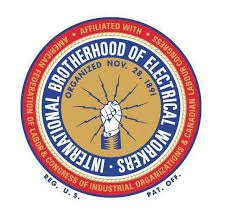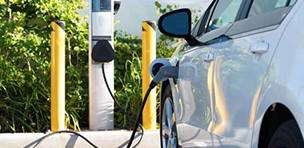Business Manager: Sean W. Daly
IBEW Members to Meet Unprecedented EV Charging Needs
Nearly $5 billion in new electrical vehicle charging systems are on the way, and demand for qualified installers has never been higher. That’s why President Lonnie Stephenson has launched the Talent Pipeline Challenge to get at least 10,000 electricians across the U.S. signed up to be credentialed in the Electric Vehicle Infrastructure Training Program.
“EVITP has become such a gold standard in our industry that the Biden administration recently made it their preferred program for training the men and women who will be installing and maintaining thousands of EV charging systems across the United States over the next several years,” he said.
EVITP is a 20-hour course for journey-level electricians. Members interested in signing up for the training can enroll in EVITP certification through their local JATC or ETA facility. The training program — covering equipment specs, vehicle types, solar and storage integration and more — can be taken in person, online or some combination of the two.
Business managers across the U.S. have been provided links for members to register to receive EVITP credentials. Members must complete the 18-hour course and its two-hour certification test to qualify for the challenge.
What’s driving this challenge is the nearly $5 billion made available under President Biden’s Bipartisan Infrastructure Law to help build a national network of 500,000 charging stations located along so-called “Alternative Fuel Corridors” by 2030. Even better for the IBEW, the administration in recent months has indicated a strong preference for EVITP, with the program set to become the only named training standard in new federal rules regarding EV charging station construction.
According to estimates, nearly one out of every five vehicles on U.S. roads by 2030 — about 30 million — is expected to be electric. In addition, gasoline prices have spiked worldwide, helping to drive interest in vehicles that don’t need gasoline or diesel for power.
“Getting in early practically guarantees that most of the coming installation and maintenance work will go to the IBEW. By helping the IBEW meet this challenge, you’re laying a foundation that will allow us to dominate this new sector,” Stephenson said.
Stephenson is calling particularly on business managers in the U.S. to make it a top priority to enroll members in EVITP training. “These next weeks will be make-or-break to honor our commitment to having IBEW professionals ready, willing and able to meet the demands of the EV vehicle charging network buildout,” he said.
With more than 12,250 EVITP-credentialed electricians, the IBEW has met the initial challenge, although efforts to enroll members will continue. For more on the Talent Pipeline Challenge, click here.

